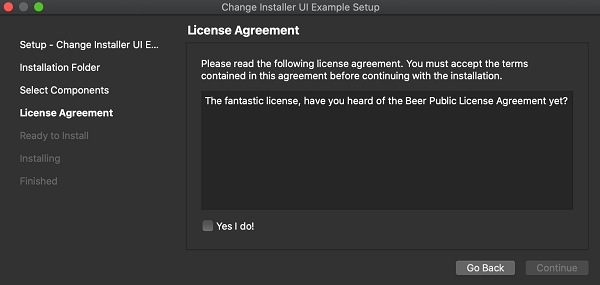Change Installer UI Example
Using a component script to change the installer UI.

Change Installer UI demonstrates how to use the Component() function to change the default text for the check box label on the license check page. This example does not install any components, but it specifies a dummy component in the package information file, because installers without components are not allowed.
Configuring the Example Installer
The installer configuration file, config.xml, in the config directory specifies the text and default values used in the installer:
- The
<Name>element sets the application name and adds it to the page name and introduction text. - The
<Version>element sets the application version number. - The
<Title>element sets the installer name and displays it on the title bar. - The
<Publisher>element sets the publisher of the software (as shown in the Windows Control Panel, for example). - The
<StartMenuDir>element sets the name of the default program group for the product in the Windows Start menu. - The
<TargetDir>element sets the default target directory location to be within theIfwExamplesdirectory in the home directory of the current user (because it uses the pre-existing variable,@HomeDir@, as part of the value). For more information, see Predefined Variables.
<?xml version="1.0" encoding="UTF-8"?>
<Installer>
<Name>Change Installer UI Example</Name>
<Version>1.0.0</Version>
<Title>Change Installer UI Example</Title>
<Publisher>Qt-Project</Publisher>
<StartMenuDir>Qt IFW Examples</StartMenuDir>
<TargetDir>@HomeDir@/IfwExamples/changeuserinterface</TargetDir>
</Installer>Creating the Example Package Information File
The installer package information file, package.xml, in the meta directory specifies the components that are available for installation:
- The
<DisplayName>element sets the human-readable name of the component. - The
<Description>element sets the human-readable description of the component. - The
<Version>element sets the version number of the component. - The
<ReleaseDate>element sets the date of release for this component version.
- The
<Default>element specifies whether the component is preselected for installation in the user interface by default. - The
<Script>element sets the file name of the loaded JavaScript file. - The
<Licenses>element sets thenameof the license agreement that the end user accepts, as well as the filename of thefilethat has the license.
<?xml version="1.0" encoding="UTF-8"?>
<Package>
<DisplayName>Dummy Component</DisplayName>
<Description>This example does not install any components. It demonstrates
modifying the text on the next page.</Description>
<Version>1.0.0-1</Version>
<ReleaseDate>2013-01-01</ReleaseDate>
<Default>true</Default>
<Script>installscript.qs</Script>
<Licenses>
<License name="Beer Public License Agreement" file="license.txt" />
</Licenses>
</Package>Updating UI Text
In installscript.qs, the Component() function adds the license check page and connects to the changeLicenseLabels signal when end users enter the page:
function Component()
{
if (!installer.isCommandLineInstance())
gui.pageWidgetByObjectName("LicenseAgreementPage").entered.connect(changeLicenseLabels);
}The changeLicenseLabels function changes the text label for the accept license check box on the page:
changeLicenseLabels = function()
{
page = gui.pageWidgetByObjectName("LicenseAgreementPage");
page.AcceptLicenseLabel.setText("Yes I do!");
}Note: Do not use the Component() function to add translations.
Generating the Example Installer
To create the example installer, switch to the example source directory on the command line and enter the following command:
- On Windows:
..\..\bin\binarycreator.exe -c config\config.xml -p packages installer.exe
- On Linux or macOS:
../../bin/binarycreator -c config/config.xml -p packages installer
This creates the installer to the current directory.
Files:
- changeuserinterface/changeuserinterface.pro
- changeuserinterface/config/config.xml
- changeuserinterface/packages/org.qtproject.ifw.example.changeuserinterface/meta/installscript.qs
- changeuserinterface/packages/org.qtproject.ifw.example.changeuserinterface/meta/license.txt
- changeuserinterface/packages/org.qtproject.ifw.example.changeuserinterface/meta/package.xml
© 2021 The Qt Company Ltd. Documentation contributions included herein are the copyrights of their respective owners. The documentation provided herein is licensed under the terms of the GNU Free Documentation License version 1.3 as published by the Free Software Foundation. The Qt Company, Qt and their respective logos are trademarks of The Qt Company Ltd in Finland and/or other countries worldwide. All other trademarks are property of their respective owners.

